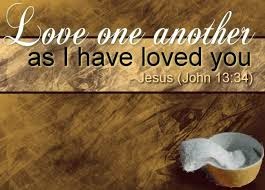Love or Lose
Thursday evening we gathered for Maundy Thursday worship, the first of the Three Days of Holy Week. This is the message I shared with those who gathered at Bethel Lutheran Church, Portville, NY. The scripture text is John 13:1-17, 31b-35.
Today is Holy Thursday or as
it is also called, Maundy Thursday. Maundy means commandment or mandate.
Tonight, we celebrate Jesus commandment to his disciples to love each other as
He loved them. Just how did Jesus love?
First of all, Jesus loved
scandalously. He turned the roles of master and slave upside down as he washed
his disciples’ feet. Jesus acts out for us a drama of what his followers are to
be and do.
The
washing of the feet of a guest is an issue of hospitality. It was a way of
welcoming one’s guests. Normally, the guests were given a basin and towel to
wash their own feet. Sometimes it was work that a household slave would do. But
it certainly would not be something that would be done in the middle of a meal
nor by the master of the house or a prominent teacher.
Jesus
identifies himself as the disciples’ “Lord and Teacher” (v. 14). It would not
have been so unusual to a pupil to wash a teacher’s feet, but here the roles
are reversed. Jesus’ action subverts the regular hierarchy of the social
structure of that time. He has undermined the accepted patterns of authority of
his day. Actually, Jesus has redefined authority in new and vivid images of a
basin and a towel.
“The world
demands a pecking order in which everyone knows his or her place and in which
power is carefully protected” (Charles B. Cousar, Texts for Preaching: A
Lectionary Commentary Based on the NRSV-Year A, 245). Jesus’ actions
challenge the disciples to reject the structure of the pecking order and
replace it with a community where such reversals of roles are the norm rather
than the exception.
Jesus did
not love people from a distance He got up close and personal and loved
intimately. Foot washing removes the possibility of distance between Jesus and
his followers and “brings them face to face with the love of God…” (Gail R.
O’Day, The New Interpreter’s Bible: Volume IX, 727).
We have a choice to make. Either
we can love as Jesus loved or we can lose out. I A few days ago I heard a story
about someone that had stopped going to a church she had been a part of for
many years. When asked why she had changed churches, the woman replied that it
had to do with the class of people that go to the church she had left. There
were too many common people.
I was struck by the woman’s
response, especially in light of tonight’s gospel reading. It got me thinking
about the class of people Jesus spent most of his time with. His disciples were
a mixture of fishermen, tax collectors and a few political freedom fighters to
boot. They were not from the upper crust of society, but were decidedly blue
collar or lower status workers. After all, Jesus tended to get into
trouble when he spent time with the religious and social elite.
What is
Jesus telling us here at Bethel and how should we respond to our community?
Jesus is telling us that our doors should be open to everyone whether they are
white collar, blue collar, pink collar or whether they have a dirty collar.
When we start to snub out nose at those who enter our door, then it is time to
close our door.
When we don’t love others,
we become inwardly focused—being more concerned about the survival of the
institution than the opportunities to love each person God brings our way. If
we don’t love as Jesus loved, we cannot have Jesus’ perspective of people.
Jesus calls his disciples
and us to love as he did. But that call cannot be separated from the call to
participate with Jesus as he cleanses us. Experiencing Jesus’ loving service
enables us to embody such love and service to others.
Amen!



Comments